Thrushes Bulletin

I SUPPOSE it’s inevitable when writing a regular bulletin that eventually there will be something not so positive to report on. My troubles began within the week of the Morpeth CBS show (October 28, 2017), which I reported on in the last bulletin (see February 7, 2018 issue). The birds had been returned to their individual stock cages and, while I was feeding them, something about the satinette song thrush cock caught my eye.
He seemed to have a scab-like growth on one side around the area of the hinge of the beak. It hadn’t been noticeable when he was at the show, but now it was unmistakeable. Otherwise, he looked the picture of health; bright-eyed with no sign of a fluffed-up appearance. I began searching the internet and was shocked to realise it might be bird pox. How was this possible? Well, online information was pretty clear that a midge bite was the likeliest culprit. I spoke to my brother who has extensive experience with racing pigeons and bantams, and he said the prescribed action in the pigeon world was to let it run its course.
The internet basically gave me much of the same advice, although there was a suggestion that a general antibiotic could be administered to guard against any secondary infection. My brother knocked me up a concoction and I started a course in the drinking water. I was relieved that this bird was separated from all of the other thrushes and that, at the time, he otherwise looked in remarkably rude health.
Trouble strikes twice
Denne historien er fra March 7, 2018-utgaven av Cage & Aviary Birds.
Start din 7-dagers gratis prøveperiode på Magzter GOLD for å få tilgang til tusenvis av utvalgte premiumhistorier og 9000+ magasiner og aviser.
Allerede abonnent ? Logg på
Denne historien er fra March 7, 2018-utgaven av Cage & Aviary Birds.
Start din 7-dagers gratis prøveperiode på Magzter GOLD for å få tilgang til tusenvis av utvalgte premiumhistorier og 9000+ magasiner og aviser.
Allerede abonnent? Logg på
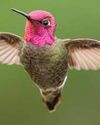
The World's Best-Known Hummingbird?
Intensively studied, the gem-like Anna’s hummingbird is a welcome visitor to the gardens of America’s most populous state: California. Bill Naylor investigates its life history
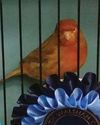
The charm of the English Cinnamon
Despite its long and complicated history, the true Cinnamon canary is still with us – in the hands of a tiny group of breeders. DONALD SKINNER-REID reckons it deserves wider appreciation
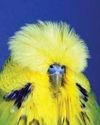
Spangles: a personal overview
FRED WRIGHT relates a budgie story of over-exploitation, consequent problems and abundant potential for the future

New converts to old breeds
Old and rare canaries have a reputation for adding fresh interest and challenge to the hobby. PETE HOOK and NICK JOY agree, and explain the birds’ charm to Dave Brown

Themed aviaries are a hit with the public at annual Stafford show
DECORATIVE AVIARY DISPLAYS from a CBS and an online bird keeping advice group were voted in the top three by visitors for the inaugural Stafford Aviary Competition.
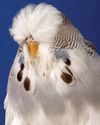
Pieds with potential
More than just a lesser variety, the dominant pied will introduce challenge and change into most studs, reckons CLIVE WAKEMAN. Here he discusses pairings to try and others to avoid

Club News
Welcome to the club and show pages – the bit that’s all about you Results: convention, specialist & rare and Breeder of the Year
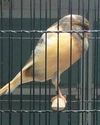
Canaries Month by Month:
With Christmas around the corner, BRIAN KEENAN is well into his winter programme, and reckons he might deserve a nice outcross
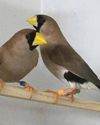
Smart Choice, Docile Nature
Dave Brown welcomes the masked grassfinch to his birdroom and shares advice on this lovely Australian species
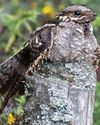
The truth about the ‘flying toad'
Odd local names and weird superstitions can’t hide the beauty and elegance of the nightjar, a species that has made a fascinating subject in a few zoo collections, reveals BILL NAYLOR